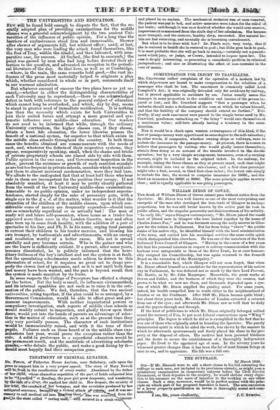WTLLIA.V DIXON OF GOVA.N.
Tax death of William Dixon of Govan cannot pass without notice from the ,Spectator. Mr. Dixon was well known as one of the most enterprising and energetic of the men who developed the iron trade of Glasgow to its huge proportions, but he was still better known by the active part he took in public affitirs, and the singular generosity and disinterestuess. of his activity. "In early life," says a Glasgow contemporary, "Mr. Dixon joined the small knot of liberal men in Glasgow who were linked. together by the name of Charles James Fox," and he was foremost among the early movers in Glas- gow for the reform in Parliament. But far front being " above " the publin duties of his native city, he identified himself with the local administration of the town, and carried into his municipal services the same noble spirit which distinguished him elsewhere. He was one of the members of the first Reformed Town Council of Glasgow. "Having in the course of a few years felt that his personal interests in respect to railway communication with the harbour were antagonistic to those of the River Trust, he at once honour- ably resigned his Councillorship, but was again returned to the Council Beard on the extension of the Municipality."
It is a remarkable fact, which Glasgow will not soon forget, that when Mr. Dixon offered himself as a candidate for the representation of his native city in Parliament, he was defeated not so mush by the then Lord Provost, Mr. Heade, as by Mr. John Macgregor. Meanwhile, the great works at Govan and Calder, and the business of which they were the centres, had grown to be what we now see them, and thousands depended upon a aye- Mm of which Mr. Dixon supplied the guiding mind. For some years, indeed, his health compelled him to reside either in the neighbourhood of London or on the Continent After 1848 Mr. Dixon became quite blind ; but about three years back, Mr. Alexander of London extracted a cataract from one of the eyes ; and afterwards Mr. Dixon saw so well that he daily read the papers through and through.
If the knot of politicians to which Mr. Dixon originally belonged rallied round the memory of Fox, he put moat Liberal constructions upon "Whig"' principles. The degree to which he did so is exemplified in the fact that he was one of those who originally aided in founding the Spectator. The purely disinterested spirit in which he aided the work, was shown by the manner in which he'afterwards spontaneously and freely placed his share in the pro- perty at the disposal of others. His motives had been personal kindness and the desire to secure the establishment of a thoroughly independent paper. He lived to the appointed age of man. In the seventy years-he witnessed greater changes than it has been the lot of most human beings at once to see, and to appreciate. His life was a full one.


























 Previous page
Previous page